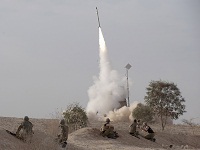Russian S-300 systems to materialize in Syria?
The events around Syria have clearly defined the balance of power on the international arena. The United States is very close to achieving its goals, the main one of which is to replace the current regime of President Assad. Israel, according to the press, was able to convince Russia to freeze the deliveries of air defense systems to official Syrian authorities, and the U.S. announced that it would begin to supply weapons to Syrian rebels.

Last week, British newspaper The Sunday Times published a sensational piece of news saying that the Russian contract to supply S-300 anti-aircraft missile systems to Syria would be suspended. The publication referred to a senior government source, who said that President Vladimir Putin and Prime Minister of Israel Benjamin Netanyahu made the decision in mid-May, during their official meeting in Sochi. According to The Sunday Times and its anonymous source, Moscow dropped the plans to sell S-300 systems fearing that modern high-precision weapons would fall into the wrong hands. Israel is a home to many immigrants from Russia and the CIS countries. The Russian side does not want S-300 systems to be used against civilian aircraft that fly from Ben-Gurion airport, says a source.
A few days ago, Israeli media reprinted the story that originally appeared in the London-based newspaper Al-Quds al-Arabi about the delivery of Russian air defense systems to Syria. The article said that four divisional S-300 systems, together with the group of military advisers had already been delivered to Syria. According to other sources, such as the Commander of Israeli Air Force, Major-General Amir Eshel, the Russian-made complexes have not been delivered to Syria.
Speaking at a conference in Herzliya, Amir Eshel also said that in case of war, Israel would have to win the campaign within a few days. This can be achieved if Israel uses all of its military power. During the Second Lebanon War, Israel used a small fraction of its potential, but in the next armed conflict, the country will need to use all available means, the official said.
Numerous speculations in the press around the S-300 can be considered as a part of the media war. Observers note that should Assad receive the promised air defense systems from Russia, the balance of forces in the region will change drastically. At any rate, S-300 systems are not likely to help the Syrian regime in the struggle against rebel groups, who continue to wage a brutal war against government troops.
Israeli website Ynet denied reports saying that the agreement on the S-300 was reached by Putin and Netanyahu. Most likely, the Russians will kill the clock without bringing the deal to the end and use the S-300 as a trump card, the publication wrote.
The contract with Syria for the purchase of advanced air defense systems in the amount of $800 million was signed in 2010, shortly before the outbreak of the civil war in the country. Afterwards, Moscow has repeatedly reaffirmed its commitment on military supplies to Damascus. "Russia has no plans to sell S-300 to Syria. Russia sold them a long time ago. Russia signed contracts and completes deliveries in accordance with those documents, providing the Syrians with anti-aircraft technologies," Mignews.com quoted Russian Foreign Minister Sergey Lavrov.
The debate about the arms contract between Moscow and Damascus worsened after Israeli air force struck Syrian military targets. Local news agencies previously reported that Israel conducted at least two air strikes on Syria. According to Western intelligence, the Israeli air force destroyed a batch of missiles that was supposed to be delivered to Hezbollah. Israel also attacked a research center near Damascus, local media said. About 300 Syrian soldiers were killed. The Arab League condemned the Israeli action. As Secretary General of the Arab League Nabil al-Arabi said, the Israeli aggression was a violation of international principles and laws that came threatening the stability and security of the entire region.
The official Damascus warned to immediately respond to any new attack from Israel. Soon there were rumors of the Syrian army deploying ground-to-ground missiles that could reach the Israeli capital. At the same time, Damascus increased military activity in the Golan area. Recently, Deputy Prime Minister of the Syrian government Qadri Jamil announced the start of recruitment of volunteers to carry out operations on the Golan Heights. Syria decided to refrain from launching a full-scale war with Israel, as the country is too much preoccupied with the struggle against rebels.
Either way, the Kremlin's position on Syria remains unchanged. The Russian leadership is opposed to assisting the armed Syrian opposition. At the same time, Russia refrains from concluding new arms contracts with the government of Bashar al-Assad. Obviously, Moscow does not intend to take any drastic steps in the field of foreign policy in the Middle East that could break the fragile balance of forces in the region.
Yuri Sosinski-Semikhat
Pravda.Ru
Subscribe to Pravda.Ru Telegram channel, Facebook, RSS!


